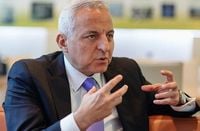In a bold move underscored by concerns about the UK's energy future, Tufan Erginbilgiç, the new CEO of Rolls-Royce, has issued a critical warning regarding the nation's ambition to develop small modular reactors (SMRs). He cautioned that unless the UK government makes swift decisions and selects companies for SMR projects by June 2025, the nation could risk falling behind in this essential technological race. His sentiment highlights a lingering fear of repeating past mistakes as the UK notably struggled in the offshore wind energy sector, missing out on leadership opportunities as other European countries surged ahead in the manufacturing of key components.
Since taking the helm in January 2023, Erginbilgiç's perspective on the urgency surrounding SMRs has grown increasingly clear. In an interview with the Financial Times, he elaborated on the long-term implications of delaying crucial government decisions on new energy technologies. He stated, “Why do you think the wind supply chain didn’t happen in the UK? These supply chains, once they are developed somewhere, it is hard to change them.” His words underline the importance of timely governmental action in establishing supply chains domestically before they become anchored elsewhere, potentially creating lasting competitive advantages for other nations.
The UK government's ambitions suggest a keen interest in the potential of SMRs to respond to the rising demand for electricity. Smaller and more modular in design, SMRs are envisaged as a solution to the recurring delays and cost inflation that larger nuclear projects have encountered, making them an attractive option in the country’s energy mix as it seeks to lower carbon emissions.
As a further demonstration of readiness to move forward, major technology firms, including Amazon and Google, have entered into power purchase agreements with nuclear providers, specifically to meet the operational demands of their expansive data centres. Rolls-Royce's SMR design stands out with a generating capacity of 470 megawatts—significantly larger than the typical outputs of competitors in the sector, which generally aim for 300 megawatts or less.
On an international level, Rolls-Royce is already carving a niche for itself. The UK-based firm was selected as the preferred supplier for an SMR project in the Czech Republic, marking a successful strategic partnership with Czech utility ČEZ. The first reactor is eagerly anticipated to commence construction near the South Bohemian Temelín nuclear power plant in the mid-2030s.
Back home in the UK, Erginbilgiç is firm on the notion that domestic projects would benefit significantly from government backing. He has noted that with adequate governmental support, it is viewed that around 70 percent of the supply chain necessary for SMR development could originate within the UK. This would not only be a morale boost but also a considerable economic uplift as the country seeks to assert itself as a leader in the burgeoning global SMR market.
Despite some speculation suggesting a potential shutdown of the SMR division, Erginbilgiç has continued to affirm his commitment to advancing the sector. His leadership thus far, characterized by proactive measures and strategic partnerships, has become paramount in shaping the future landscape of the energy sector, both domestically and internationally.
On another note, Rolls-Royce has also made headlines in the aviation sector under Erginbilgiç's leadership, as the company moves to streamline operations amidst a growing demand for aircraft engines. According to reports by The Straits Times, the company will be cutting between 2,000 and 2,500 jobs, representing approximately 6% of its workforce. This decision primarily targets senior management roles, a move to optimize and response to the ongoing shift in demand.
With nearly half of Rolls-Royce’s employees based in Britain, and significant portions in Germany and the US, this restructuring aims to align the workforce with the current market requirements. The job cuts follow a challenging period, notably during the pandemic, where the global aviation sector faced an unprecedented downturn that led to job reductions.
Despite these cuts, there remains a positive financial outlook for Rolls-Royce, with the company’s valuation reportedly surging nearly eightfold under Erginbilgiç’s leadership. In 2024, the company's underlying operating profits rose by 55% to £2.5 billion, and underlying sales increased to £17.8 billion—a 15% year-on-year growth. Notably, in a significant milestone, the hours flown by Rolls-Royce engines on passenger jets surpassed 2019 levels for the first time, indicating a robust recovery for the firm.
Moreover, Rolls-Royce's plans are extended beyond commercial aircraft, as it looks to re-enter the single-aisle jet engine market—a lucrative area previously dominated by other suppliers. The company's forward-thinking strategies in both the nuclear and aviation sectors are reflective of a broader aim to enhance operational efficiency and drive growth amidst evolving market dynamics.
As Rolls-Royce navigates these complex challenges and opportunities in both sectors, Erginbilgiç's leadership will be paramount in charting a sustainable future for the company while significantly contributing to the UK’s energy landscape and the global aviation industry.





